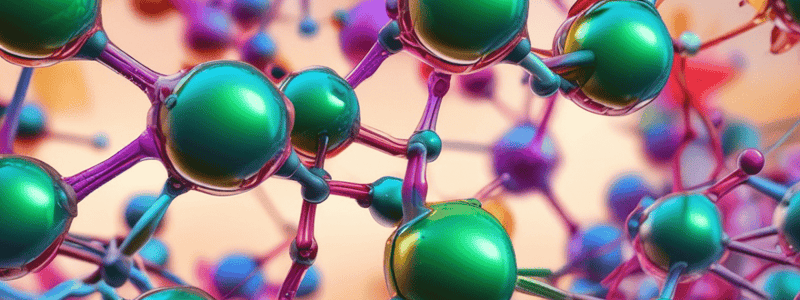Podcast
Questions and Answers
What is the bond angle in pyridine?
What is the bond angle in pyridine?
- 90 degrees
- 120 degrees (correct)
- 135 degrees
- 105 degrees
How many carbon-nitrogen bonds are there in pyridine?
How many carbon-nitrogen bonds are there in pyridine?
- Two (correct)
- Four
- Three
- One
What type of substitution does pyridine undergo?
What type of substitution does pyridine undergo?
- Addition
- Radical
- Electrophilic (correct)
- Nucleophilic
What is the resonance energy of pyridine?
What is the resonance energy of pyridine?
How is the nitrogen in pyridine bonded to other ring members?
How is the nitrogen in pyridine bonded to other ring members?
What does the third sp2 orbital of nitrogen contain in pyridine?
What does the third sp2 orbital of nitrogen contain in pyridine?
Why is pyridine a much stronger base than pyrrole?
Why is pyridine a much stronger base than pyrrole?
What is a significant difference between the reactivity of the ring in pyridine and pyrrole?
What is a significant difference between the reactivity of the ring in pyridine and pyrrole?
What is the source of pyridine compounds mentioned in the text?
What is the source of pyridine compounds mentioned in the text?
What is the significance of the 3-isomer of pyridinecarboxylic acids mentioned?
What is the significance of the 3-isomer of pyridinecarboxylic acids mentioned?
Why has there been an increase in the development of syntheses involving ring closure for pyridine derivatives?
Why has there been an increase in the development of syntheses involving ring closure for pyridine derivatives?
What happens when the picolines are oxidized according to the text?
What happens when the picolines are oxidized according to the text?
What is the electronic configuration of the nitrogen atom in pyridine?
What is the electronic configuration of the nitrogen atom in pyridine?
What type of bond angle does pyridine have?
What type of bond angle does pyridine have?
How many carbon-carbon bonds are there in pyridine?
How many carbon-carbon bonds are there in pyridine?
What does the heat of combustion of pyridine indicate?
What does the heat of combustion of pyridine indicate?
How is pyridine classified based on its properties?
How is pyridine classified based on its properties?
What makes pyridine resist addition reactions?
What makes pyridine resist addition reactions?
Which statement about the reactivity of pyridine is correct?
Which statement about the reactivity of pyridine is correct?
Which statement about the synthesis of pyridine derivatives is correct?
Which statement about the synthesis of pyridine derivatives is correct?
What is the significance of the 4-isomer of pyridinecarboxylic acids mentioned in the text?
What is the significance of the 4-isomer of pyridinecarboxylic acids mentioned in the text?
Which statement about the electronic configuration of pyridine is correct?
Which statement about the electronic configuration of pyridine is correct?
Which statement about the sources of pyridine compounds is correct?
Which statement about the sources of pyridine compounds is correct?
Which statement about the picolines mentioned in the text is correct?
Which statement about the picolines mentioned in the text is correct?
Flashcards are hidden until you start studying
Study Notes
Structure of Pyridine
- Pyridine is classified as aromatic on the basis of its properties.
- It is flat, with bond angles of 120°.
- The four carbon-carbon bonds are of the same length, and so are the two carbon-nitrogen bonds.
- It resists addition and undergoes electrophilic substitution.
- Its heat of combustion indicates a resonance energy of 23 kcal/mole.
- Pyridine can be considered a hybrid of the Kekul structures I and II.
- The circle represents the aromatic sextet.
Electronic Configuration of Pyridine
- The nitrogen atom, like each of the carbon atoms, is bonded to other members of the ring by the use of sp2 orbitals.
- The nitrogen atom provides one electron for the π cloud.
- The third sp2 orbital of each carbon atom is used to form a bond to hydrogen.
- The third sp2 orbital of nitrogen contains a pair of electrons, which are available for sharing with acids.
- This electronic configuration makes pyridine a much stronger base than pyrrole.
Pyridine Molecule
- One electron is in each p orbital.
- Two electrons are in the sp2 orbital of nitrogen.
- The p orbitals overlap to form π clouds above and below the plane of the ring.
- Two unshared electrons are still in the sp2 orbital of nitrogen.
Source of Pyridine Compounds
- Pyridine is found in coal tar.
- Along with it are found a number of methylpyridines, the most important of which are the monomethyl compounds, known as picolines.
- Oxidation of the picolines yields the pyridinecarboxylic acids.
- The 3-isomer (nicotinic acid or niacin) is a vitamin.
- The 4-isomer (Isonicotinic acid) has been used, in the form of its hydrazide, in the treatment of tuberculosis.
Synthesis of Pyridine Derivatives
- The increasing demand for certain pyridine derivatives has led to the development of syntheses involving ring closure.
Studying That Suits You
Use AI to generate personalized quizzes and flashcards to suit your learning preferences.



